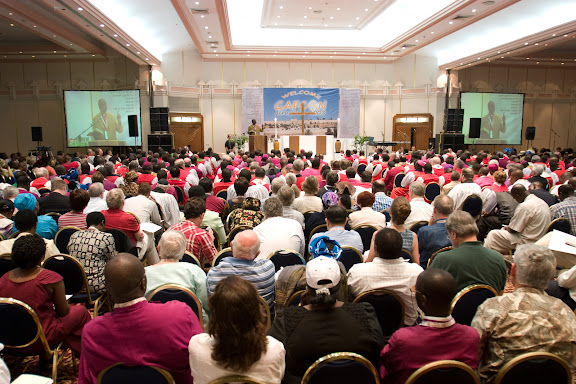 From here.
From here.George Conger
SPECIAL TO THE WASHINGTON TIMES
Sunday, June 29, 2008
JERUSALEM | Conservative Anglicans will declare a split from the U.S. Episcopal Church on Sunday, but will stop short of schism with the archbishop of Canterbury, the head of the worldwide Anglican Communion.
”There will be permanent division, one way or the other,” said Archbishop Peter Jensen of Sydney, Australia, one of the organizers of the weeklong Global Anglican Future Conference (GAFCON), adding that he expected “long-term consequences” for the Anglican Communion.
Archbishop Jensen pinned the blame for the schism on the Episcopal Church, calling its 2003 consecration of a practicing homosexual as bishop of New Hampshire “an extraordinary strategic blunder” that has divided the church.
In a statement to be released here Sunday morning, the GAFCON churches, mostly from Africa and elsewhere in the developing world, are expected to form a “church within a church,” breaking with the liberal churches of North America that also have permitted the blessing of same-sex unions.
Relations with the office of the archbishop of Canterbury will not be severed, but it appears likely that they will be qualified in some form.
The new “church within a church” will force the 80-million member Anglican Communion either to become a weak federation of independent churches or, in the unlikely event that Canterbury either kicked out the GAFCON churches or the North American churches, will produce one of the most far-reaching Christian schisms since the Protestant Reformation.
If the Episcopal Church “did not believe that there would be consequences” for consecrating an openly practicing homosexual as a bishop, “that was an arrogant thing,” Archbishop Jensen said, adding that the “consequences have been unfolding over the last five years. Now their church is divided.”
“All around the world, the sleeping giant that is evangelical Anglicanism and orthodox Anglicanism has been aroused” and will break with the Episcopal Church and the Anglican Church of Canada, he said.
The GAFCON meeting includes more than 1,200 Anglican bishops, clergy and lay leaders at the Renaissance Hotel in Jerusalem from churches that make up the majority of the communion's members.
The meeting also will announce new structures for parishes in the U.S. and Canada that no longer wish to be in communion with their national churches - an act made possible in church law and custom by the declaration that unity with the North American churches no longer exists. In addition, more than 600 Church of England clergy will reportedly swear allegiance to the new GAFCON body at a meeting next week in London.
GAFCON comes a month before the Anglican Communion summit in Lambeth, England. The Anglican churches of Nigeria, Uganda and Kenya are present here, but will boycott the once-per-decade Lambeth Conference.
It will also put forward a declaration of common doctrinal principles and lay out plans for a new Book of Common Prayer based on the historic Church of England 1662 prayer book. Nigerian Bishop John Akao said the GAFCON churches also will pursue a common way of reading and interpreting the Bible and work on a definitive catechism.
Bishop Gregory Venables of Argentina said that previous meetings with the North American archbishops and bishops had proved fruitless in resolving the disputes, which center on Biblical authority and interpretation and which played out most obviously in disputes over sex and sexuality.
“We got frustrated. We talked and talked, but where did we go?” Bishop Venables said, saying the liberal churches were quite willing to meet and discuss issues, but then continued to act as they wished. “If only they would have come and talked to us and listen to us,” a schism could have been avoided.
The Sydney archbishop, leader of the largest group of Anglicans in Australia, said he had been unsure at the start of the conference whether it would succeed.
GAFCON resembled a “ramshackle airplane, and I was never sure it was going to land,” he said, but it turned out to be one of the most “extraordinary spiritual experiences I have ever had.”

1 comment:
This article may be good for grabbing headlines, but seems to have a fair amount of puffery. (Not that I wouldn't like to see most of the statements come to pass...)
RalphM
Post a Comment